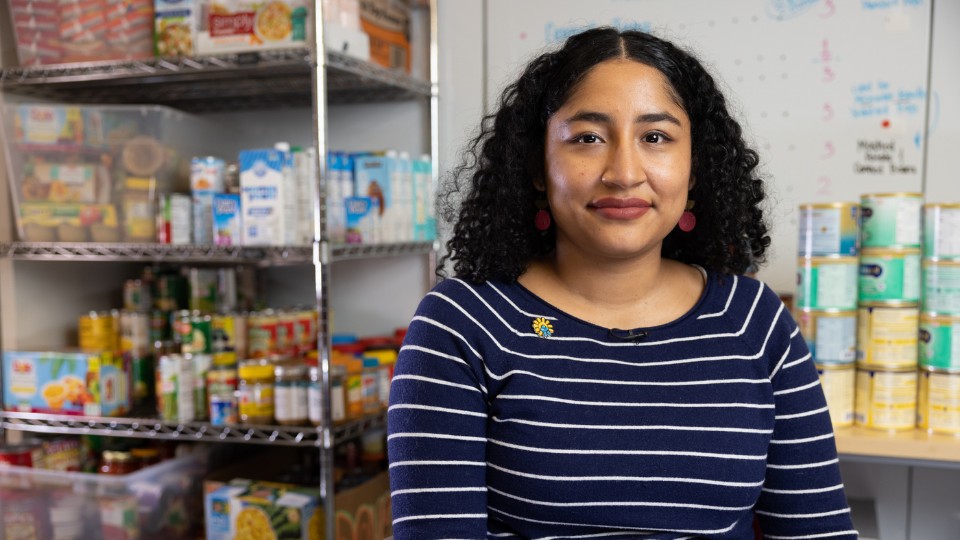“Nutrition is the foundation of health. Just like housing, food should be a human right,” says Fadhylla Saballos, registered dietician with the CHF-supported Bronx Health Collective.
This may sound like an indisputable truth, but the 13 million children who are expected to experience food insecurity this year live a very different reality. These children cannot consistently access enough nutritious food to nurture their bodies for normal growth and development, and to live a healthy, active life. Food is something they and their families struggle to obtain.
When children don’t have enough to eat, the impacts are severe. Children facing hunger are more likely to experience certain health conditions like asthma; impairments in development like language and motor skills; and social and behavioral challenges. Food insecurity can fuel food-related anxiety and disordered behaviors such as skipping meals and bingeing. As our Healthy and Ready to Learn initiative has worked to address, hunger can lead children to fall behind in school—it’s hard to concentrate when you’re hungry or have a headache from not having enough to eat. For caregivers, their own stress and discomfort from hunger also impact their children. If a child and their family experience food insecurity in the first few years of the child’s life, the impacts can be greater.
As with all health issues in this country, disparities exist across racial identities due to systemic racism: while 1 in 12 whilte people live in food insecure homes, figures are 1 in 6 for Latinx people, 1 in 5 for Black people, and 1 in 4 for Native American people.
Ensuring that all children and their families have access to an abundance of nutritious food is not only a right, as Fadhylla said, but a necessity for the health and futures of entire families.
Triggered by job losses and cuts during the COVID-19 pandemic, the realities of hunger have become an unthinkable reality for many more children over the past year and a half, so much so that some of our partner programs have permanently integrated food pantry and delivery services into their operations.
“Parents can’t work and they have to make ends meet. They end up sacrificing food quality to make sure that their children have food quantity for the whole month,” Fadhylla explains. “It can definitely affect their development and their food preferences long-term.”
At Fadhylla’s program, the team immediately saw a growing need for food when the pandemic began. They expanded their food pantry services, which already existed before the pandemic, and have also been using CHF-supported vans to deliver food directly to patients who are unable to travel or who live in shelters in remote areas of the city.
Further south in Orlando, Florida, children are experiencing the same issue. Our partners on the school-based Teen Xpress mobile clinic have been strategically visiting food distribution lines at local schools. It was during one of these visits that they met 11-year-old Tina. During Tina’s medical checkup, they asked about her mental health and her family’s needs. They learned that her caregivers had lost their jobs during the pandemic, had limited transportation, and didn’t have an adequate supply of food. They gave Tina’s family a food package, set up regular food deliveries, and scheduled virtual visits to continue addressing their needs.
“If your basic needs are not being met, then you’re less likely to be able to meet your other health needs,” says Maria Contreras, care manager coordinator with our partner program in Idaho with Family Health Services. Maria and her team have seen growing nutrition needs in their patients as well. With a grant from Children’s Health Fund specifically for health-related social needs during the pandemic, Maria’s program was able to provide food boxes to families who needed them. Each box fed a family of four with up to 14 meals and contained recipes using the foods provided.
Now in the 18th month of this pandemic with recovery nowhere in sight, federal and state policies are addressing these enormous food-security needs. President Biden spurred a historical 25% increase to the Supplemental Nutrition Assistance Program (SNAP), set to go into effect in October. Forty-two million Americans are in the program, and 43% are children. In New York City, every public school family was sent between $820 and $1320 on an EBT card as reimbursement for the cost of school meals missed during the pandemic due to remote learning.
On the front lines of communities, our providers are also not letting up. “A lot of patients are very, very thankful for having food on their table to be able to provide for their kids and families,” says Maria. “Some have even said, ‘You saved my life,’ because they had no idea where to go, how to start. Those are a lot of the stories that we get.”








